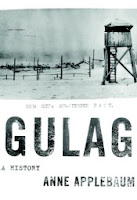
I’m currently reading one of the most depressing books ever published, Anne Applebaum’s account of the Russian Gulag system. Entitled simply Gulag, this detailed history covers virtually every aspect of the camps, from conception to dissolution. Many years ago I read Robert Conquest’s The Harvest of Sorrow, but Gulag covers a more insidious aspect of Soviet history. An aspect few Westerns remember or seem to care much about, or appear to excuse as merely trivial.
The 20th century may well have been the bloodiest and most brutal time in human history, though perhaps I say this because I came of age in that century and thus I am more aware of the detail of atrocities committed by humans against their own kind in those well-document years. I know this has been the case since time immemorial, but I still stand in shock and despair every time I read of such events. The 20th century is full of such instances, such as the Holocaust, the terror of Pol Pot, the rape of Nanking, the bombings of Nagasaki and Hiroshima. The list goes on and on. If I ever feel miserable about the state of political events in America, I can always turn to books like this one; nothing here is tough compared to what the early Soviets suffered. Nothing.
Have you read Gulag Archipelago? If so, how’s Applebaum’s book different?
I found Solzhenitsyn’s massive tome one of the most depressing books I’ve ever read; it chilled me so in some places I had to go outside in the Wyoming sun to try to warm up.
Indeed, that one and A Day in the Life of Ivan Denisovich are terribly depressing, but Applebaum’s book is exhaustive in ALL the aspects of the Gulag system. Solzhenitsyn’s book is far more personal, but since Applebaum’s book is more recent, she had greater access to the state archives.
I’m also reading Varlam Shalamov’s Kolyma Tales, but I can only manage a couple of stories at a time, as that one is just as gloomy.